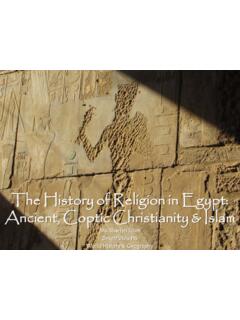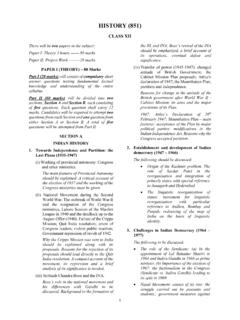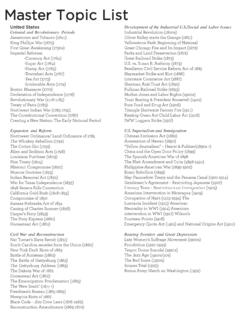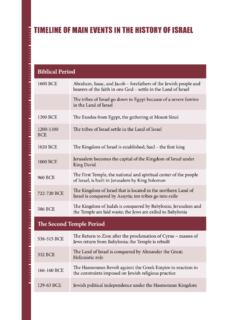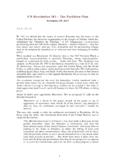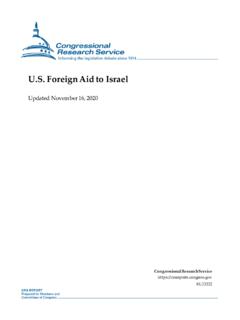Transcription of Overview of the Palestinian-Israeli Conflict
1 Overview of the Palestinian-Israeli Conflict Origins (to 1949): The Palestinian-Israeli Conflict is essentially a modern Conflict originating in the 20th century. However, the roots of the Conflict involving competing historical claims to the same stretch of land - go back thousands of years. Jewish roots in the area began sometime between 1800 and 1500 when the Hebrew people, a Semitic group, migrated into Canaan (today's Israel). Around 1000 , their descendants formally established the kingdom of Israel with Jerusalem as its capital. Israel soon split into two kingdoms and was frequently under the control of foreign conquerors: the Assyrians, Babylonians, Persians, Greeks, and ultimately the Romans.
2 However, despite repeated conquests, the Jews always retained their separate identity, mostly because of their distinctive religious beliefs. The fact that the Jews were monotheists (believers in one God), while their neighbors were polytheists set the Jews apart and instilled in them the idea that the territory of Israel was their promised land. The Jewish majority in that land was ended, however, when the Roman Empire expelled the Jewish population from Israel following a failed revolt against Roman rule in 135 AD. For the next 1,800 years, the majority of Jews lived in scattered Diasporas (ethnic communities outside of their traditional homeland) throughout Europe and the Middle East.
3 Meanwhile, the land, which the Romans now named Palaestina,' or Palestine' in its English form, was inhabited by small groups of Jews, who had gradually returned to the area, along with other local peoples and some colonists brought in by the Romans. In the 7th century AD, Palestine came under the control of Arabs, who introduced into the region the Arabic language (a Semitic language related to Hebrew) and the religion of Islam, (a monotheistic religion related to Judaism and Christianity). Although there remained a Jewish minority in the area, comprising less than 10% of the total population, from the 7th century to the mid-20th century, the majority of the inhabitants were Arabic-speaking Palestinians.
4 Most Palestinians are Muslims, but there is also a significant number of Palestinian Christians. Jews, Christians, and Muslims lived together relatively peacefully during the centuries that Palestine was part of the Ottoman Empire (1517-1918). However, the situation has changed over the course of the last century. As with so many modern-day conflicts, the struggle between Jews and Palestinians developed as a product of modern nationalism, which spread throughout Europe and eventually into the Middle East during the 19th century. Nationalism can be a unifying force, bringing together people of all different social classes and even joining inhabitants of different countries or empires on the basis of a common language, culture, and religion.
5 However, it can also be a disruptive force, calling for the destruction of multi-national empires and leading to discrimination against ethnic or religious minorities. The rise of nationalism had major repercussions for the Jewish Diasporas of Europe. On the one hand, Jews had an increased opportunity even pressure - to assimilate and become members of the newly emerging nations' in which they lived, an option that brought obvious advantages but would also require them to give up their separate identity. On the other hand, nationalism fanned the flames of anti-Semitism (hostility toward the Jews), a European prejudice which had originally been based on religious feeling but which now became more intensely political as Jews were seen as foreigners' hindering the development of national unity.
6 As attacks on Jews increased, especially in Eastern Europe, Jews responded by developing their own form of nationalism - the Zionist movement - which emerged in Europe in the 1880's and called for the establishment of a Jewish national homeland in Palestine. Inspired by political Zionism, small groups of Jews left Europe and set up farming settlements in Palestine, which was then part of the Ottoman Empire. At first these settlements were small, and the newcomers faced little opposition from the established population. After all, as late as1917, the Jews were still less than 10% of the total population of Palestine and thus not seen as a threat by the local inhabitants.
7 However, tensions mounted during and after the First World War. European, particularly British, policies during World War I played a major role in bringing about a Conflict between Jews and Arabs in the Middle East. Because the Ottoman Empire (of which Palestine was a part) was allied with Germany and Austria against Great Britain and its allies, the British entered into negotiations with an arab leader planning a revolt against the Ottoman Empire. During these discussions in 1915, the British promised the Arabs an independent state after the war. Though the boundaries of the proposed state were never formally settled, arab leaders believed that their people would be united in one large country, which would, of course, include Palestine.
8 In the meantime, the Western powers had other ideas, secretly signing an agreement to divide most of the area into French and British-controlled mandates.' To make matters more complicated, the British courted international Jewish support by issuing the Balfour Declaration, which supported the concept of a Jewish homeland in Palestine. In essence, control of Palestine was promised to three different groups: the Arabs, British, and Jews! Thus, when the war ended and the British took charge of the Palestinian Mandate, both Arabs and Jews felt that the British had broken their promises to them.
9 Relations between Palestinians and Jews declined rapidly. The Balfour Declaration had alarmed Palestinians, who saw it as British favoritism toward the Jewish minority. Their fears grew as Jewish immigration increased dramatically, particularly after the rise of Hitler to power in Germany. To Jews fleeing from persecution in Europe, Palestine was one of the few places of refuge, especially as the United States and other countries closed their doors to refugees desperate to escape Nazi persecution. However, to Palestinians, the arrival of a large Jewish immigrant population altered the balance of the population, displaced many people from their land, and threatened their goal of establishing an independent arab state in the region.
10 Violence soon erupted between the groups. The situation deteriorated in the immediate aftermath of World War II. Survivors of the Holocaust swelled the number of Jewish immigrants to the region, and the Allied victors, horrified by the revelation of large-scale genocide in Europe, were reluctant to stop them. As violence between Jews and Arabs grew, the British declared its Mandate over Palestine to be unworkable, turning control of the area over to the United Nations. Resolution 181 divided Palestine in two: giving 55% of the land to the Jews and 45% to the Palestinians, while putting the city of Jerusalem under a separate international authority.





